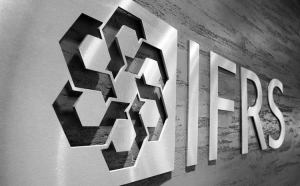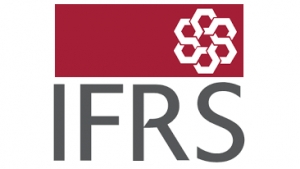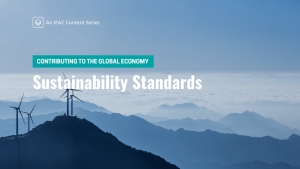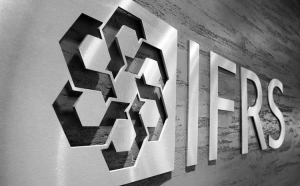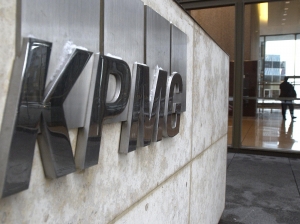عرض العناصر حسب علامة : IFRS Foundation
عينت مؤسسة المعايير الدولية لإعداد التقارير المالية (IFRS) خورخي فاميليار وكيكو تاشيرو كأمناء جدد
أعلنت مؤسسة المعايير الدولية لإعداد التقارير المالية (IFRS) اليوم عن تعيين أمناء جديدين وإعادة تعيين رئيس مجلس الأمناء إركي ليكانين لفترة ثانية وكذلك الأمناء سارة جيه السحيمي والدكتور سوريش بي كانا.
معلومات إضافية
-
المحتوى بالإنجليزية
IFRS Foundation appoints Jorge Familiar and Keiko Tashiro as new Trustees
The IFRS Foundation has today announced the appointment of two new Trustees and the re-appointment for a second term of Trustee Chair Erkki Liikanen as well as Trustees Sarah J Al Suhaimi and Dr Suresh P Kana.
The IFRS Foundation Trustees are responsible for the strategy, governance and oversight of the Foundation, as well as the International Accounting Standards Board (IASB) and the International Sustainability Standards Board (ISSB).
Jorge Familiar, originally from Mexico and now living in Washington DC, has more than 20 years of experience in leadership roles in the financial sector. He is currently Vice-President for Finance and Group Controller for the World Bank and has recently been appointed Vice-President and Treasurer effective from 1 January 2022. Jorge has worked for the World Bank twice in his career, as member of the Board of Executive Directors during his first stint between 2004 and 2008, and as Vice-President of various portfolios, including the Latin America and Caribbean Region, in his current run since 2010. Earlier in his career, he was CEO of Mexico’s Instituto Fonacot, a government-owned financial institution, and Vice-Chair of Securities and Derivatives Markets Supervision at the Comisión Nacional Bancaria y de Valores, a government agency in Mexico.
Keiko Tashiro, from Japan, is Deputy President at Daiwa Securities, a position she has held since 2019. She is a Chartered Financial Analyst and has worked at the Daiwa group of companies since 1986. Before becoming its Deputy President, Keiko was a member of its Board from 2014. She also serves as the group’s Head of Overseas Operations and Head of Sustainable Development Goals. She is a member of the Financial System Council at the Japanese Financial Services Agency and a Trustee at the Japan Association of Corporate Executives, among others.
Jorge and Keiko will succeed Guillermo Babatz and Kazuyuki Masu, who step down at the end of 2021.
The Trustees are pleased to welcome Jorge and Keiko and look forward to working with them. They thank their departing colleagues Guillermo and Kazuyuki for their dedicated service and wish them well for the future.
All appointments and re-appointments are for a three-year period, effective from 1 January 2022, and have been approved by the IFRS Foundation Monitoring Board, a group of capital market authorities to whom the Trustees are accountable. - البلد الأردن
تعزيز تقارير الشركات: إعادة النظر في لبنات بناء الاستدامة
نشر الاتحاد الدولي للمحاسبين تحديثًا قصيرًا من صفحتين لخارطة الطريق إلى الأمام للإبلاغ عن معلومات الاستدامة
معلومات إضافية
-
المحتوى بالإنجليزية
Dear Colleagues,
Today, IFAC published a short, two-page update to our The Way Forward roadmap for reporting sustainability information that we issued last September. This new “schematic” endeavors to explain how a “building blocks approach” encourages a global system of consistent, comparable, and assurable sustainability information that enhances corporate reporting.
Admittedly, there is some confusion about how this actually works, so we have tried to remove some of the complexity and more clearly demonstrate how various reporting initiatives at the global and jurisdiction level can best fit together to meet the needs of all stakeholders.
Block 1: Investor-focused sustainability information that is material to Enterprise Value. To meet the needs of capital markets, these standards must be global, and we have called on the IFRS Foundation to set up a new sustainability standards board.
Block 2: Multi-stakeholder focused sustainability reporting that helps a wider range of stakeholders understand a company’s positive and negative contributions to sustainable development and impacts on economy, environment, and people. This reporting could be based on global standards or guidance and/or jurisdiction-specific requirements to meet specific public policy objectives.
The IFRS Foundation appears to be moving decisively toward establishing a new International Sustainability Standards Board (“ISSB”) that will provide a global foundation—Block 1. One benefit of this approach is that connectivity can be established between traditional financial reporting (under the IASB) and sustainability information material to enterprise value (under the new ISSB). These baseline, investor-focused sustainability standards may become mandatory in some jurisdictions or could be used as best-practice guidelines in others.
Reporting with a multi-stakeholder focus (Block 2) is likely to be harder to harmonize at the global level because stakeholders who want this information are often concerned with specific public policy/societal objectives that vary between jurisdictions. To the extent that widely accepted sustainability reporting initiatives can fill these jurisdiction-specific needs, more harmonization and comparability can be achieved.
The building blocks approach relies, to the extent possible, on defining reporting requirements in a way that allows companies to collect specific information and data on a given sustainability matter once, and then use that same information to satisfy reporting requirements under either Block 1 or Block 2, as appropriate. Digital tagging of reported information can facilitate this “interoperability.”
Finally, it’s important to recognize that the building block approach supports the evolution that can occur in sustainability topics over time. The information that broader societal stakeholders want today can quickly become information that investors factor into their asset allocation decisions—and may ultimately end up being reflected in GAAP financial statements and disclosures. Page 2 of the schematic includes a carbon emissions example to illustrate this point.
Since IFAC issued its Way Forward roadmap last year, we have seen the announcement of the Value Reporting Foundation, the incorporation of TCFD’s framework into a climate prototype, an emerging discussion in the U.S. about climate (and possibility broader ESG) disclosures, the forward-looking discussion led by the FRC in the U.K. on the future of corporate reporting, and aspirational draft legislation from the European Commission that proposes to put sustainability-related information on a level footing with financial information. All of this, plus decisive steps by the IFRS Foundation, including last week’s proposed amendments to the Constitution of the Foundation that accommodate setting up an ISSB. IFAC urges our member organizations to provide their comments to the IFRS Trustees.
All of this is great progress and has served to clarify IFAC’s thinking about the journey ahead. We welcome your feedback on the approach we have outlined here, and we hope to see you at future IFAC events addressing the building blocks approach and the broader journey to an enhanced corporate reporting world.
Cheers!! - البلد عالمي
ملخص اجتماع أمناء مؤسسة IFRS في سبتمبر 2021
ملخص الاجتماع الذي عقد في 20 سبتمبر 2021
مؤسسة المعايير الدولية لإعداد التقارير المالية (IFRS) تعيّن أمينا جديدا
معلومات إضافية
-
المحتوى بالإنجليزية
The IFRS Foundation has appointed Masamichi Kono as a Trustee, effective 1 July 2021. Mr Kono’s distinguished career has spanned more than four decades and he has a wealth of regulatory, supervisory and policy experience in national authorities and international organisations overseeing global financial institutions and markets.
The IFRS Foundation Trustees are responsible for the governance, oversight and strategy of the Foundation and the International Accounting Standards Board, which sets IFRS Standards. The appointment has been approved by the IFRS Foundation Monitoring Board, to whom the Trustees are accountable.
He is currently serving as Deputy Secretary General of the Organisation for Economic Cooperation and Development (OECD), where his responsibilities include setting the strategic direction of OECD policy on environment, tax, trade and agriculture, along with leading financial and enterprise affairs. He oversees initiatives on infrastructure and sustainable growth and represents the OECD at the Financial Stability Board.
Mr Kono has held senior and executive roles at the Ministry of Finance and the Financial Services Agency of Japan.
He served as Chairman of the International Organization of Securities Commissions (IOSCO) Technical Committee, and thereafter as Chairman of the IOSCO Board. He was also Co-chair of the Financial Stability Board’s regional consultative group for Asia and Chair of the IFRS Foundation Monitoring Board from 2013 to 2016.
Erkki Liikanen, Chair of the IFRS Foundation Trustees, said:
Masa brings a wealth of experience that is highly relevant to the current work of the IFRS Foundation and to our plans for the future. On behalf of the Foundation and the Trustees, I congratulate Masa on his appointment and look forward to working with him.
Masamichi Kono said:
I am honoured and delighted to join the IFRS Foundation as a Trustee and look forward to contributing to its mission of bringing transparency, accountability and efficiency to global financial markets. Sustainable finance has been an important topic that I have been working on at the OECD, so I look forward to participating in the ongoing discussions on the critical role of the IFRS Foundation in this area.
ملخص إخباري شهري من مؤسسة IFRS ومجلس معايير المحاسبة الدولية لشهر أغسطس 2021
تجدون أدناه ملخصًا موجزًا للأخبار والأحداث من مؤسسة IFRS ومجلس معايير المحاسبة الدولية (Board) خلال الشهر الماضي:
معلومات إضافية
-
المحتوى بالإنجليزية
August 2021 monthly news summary
Please find below a brief summary of news and events from the IFRS® Foundation and the International Accounting Standards Board (Board) over the past month:
Three new members appointed to the IFRS Interpretations Committee
The IFRS Foundation Trustees have appointed Andre Besson, Karen Higgins and M P Vijay Kumar to the IFRS Interpretations Committee, effective immediately.
Watch: Japanese-language webcast on Third Agenda Consultation
This webcast provides an overview of the Request for Information Third Agenda Consultation, upon which the Board is seeking feedback until 27 September 2021.
Investor Update August 2021 available
Issue 24 of the Investor Update includes a summary of various technical consultations currently open for comment and an interview with Philip Robinson, accounting specialist in the Corporate Finance Group at Moody's Investors Service and member of the Capital Markets Advisory Committee (CMAC).
معايير الاستدامة
نحن بحاجة إلى عملية وضع معايير منسقة ومتماسكة وعالمية وموثوقة للمعلومات المتعلقة بالاستدامة. تعرف على التزام ال IFAC بدعم هذا التحول وتعزيز تقارير الشركات في جميع أنحاء العالم.
معلومات إضافية
-
المحتوى بالإنجليزية
A growing, global demand for sustainability—in society, in public and private organizations, and on our planet—has fueled demand for enhancing corporate reporting. For investors and sustainability-minded stakeholders to assess a company’s future performance, they need a clear and comprehensive picture of its ability to create sustainable value over time—not just a snapshot of its finances.
The corporate reporting system needs to evolve and expand to deliver the right information—to shareholders, regulators, and the public. IFAC is committed to working on behalf of the global accountancy profession to address the evolution of standard setting and corporate reporting.
Rationalization and alignment need to occur for sustainability information to achieve its full potential. As a result, in September 2020, IFAC called for a global solution led by an International Sustainability Standards Board to sit alongside the International Accounting Standards Board under the IFRS Foundation.
We are on a journey toward a unified, coherent, global and authoritative standard-setting process, with outcomes applied everywhere. IFAC calls on the accountancy profession to lead and support this transformation—both in responding to change and anchoring it in essential skillsets. - البلد الأردن
ملخص إخباري شهري من مجلس معايير المحاسبة الدولية ومؤسسة IFRS يوليو 2021
يرجى الاطلاع أدناه على ملخص موجز للأخبار والأحداث من مجلس معايير المحاسبة الدولية ومؤسسة IFRS خلال الشهر الماضي:
معلومات إضافية
-
المحتوى بالإنجليزية
Please find below a brief summary of news and events from the International Accounting Standards Board (Board) and the IFRS® Foundation over the past month:
Meet the new IASB Chair—Andreas Barckow
Andreas Barckow is no stranger to the IFRS Foundation, and on 1 July 2021 he began his first term as Chair of the Board. Here he talks about his career, his experience at the Foundation so far and his priorities for the next few years.
For the first time in his new role, Andreas will address delegates at the World Standard-setters Virtual Conference taking place on 27-28 September, sharing his first impressions of joining the Board from the perspective of a former national standard-setter. Find out how to register or read the latest newsletter for national standard-setters.
Update on IFRS Foundation Trustees’ work on sustainability
Earlier in July, the Trustees hosted two webinars covering similar updates on their work on sustainability—watch the recordings here. You can also read a summary of the Trustees’ meeting held virtually on 26 July 2021 during which they discussed arrangements for seed capital for the new board. The Foundation also responded to a communiqué from the G20 Finance Ministers and Central Bank Governors that welcomed the Trustees’ work programme to develop a baseline global reporting standard under robust governance and public oversight. Finally, you can see the recording of Trustee Chair Erkki Liikanen taking part in a panel debate on regulations, disclosures, financial risk and private financing for the green economy at the recent International Conference on Climate Change.
To keep abreast of developments in the Foundation’s project on sustainability, sign in or register on ifrs.org and move the relevant slider to green under ‘Categories’ on your ‘Follows and notifications’ settings.
Board proposes minor amendment to transition requirements for insurers applying IFRS 17 and IFRS 9 for the first time
The proposed narrow-scope amendment to the transition requirements in IFRS 17 Insurance Contracts does not affect any other requirements in IFRS 17.
IASB proposes reduced disclosure requirements for subsidiaries
The Board has also proposed a new IFRS Standard that would permit eligible subsidiaries to apply IFRS Standards with a reduced set of disclosure requirements. The proposals are designed to ease financial reporting for eligible subsidiaries while meeting the needs of the users of their financial statements.
IASB extends the comment period for targeted Standards-level disclosure consultation
The Board decided at its 21 July 2021 meeting to extend the comment period for Exposure Draft Disclosure Requirements in IFRS Standards—A Pilot Approach to next January because of the unique nature of, and significant new thinking in, the proposals. In particular, the comment period will allow more time for preparers to conduct fieldwork and provide feedback on the practical application of the proposals.
You can also watch the recording of a virtual workshop on this consultation held by the Board in conjunction with the European Accounting Association (EAA) and the European Financial Reporting Advisory Group (EFRAG).
Webinar recordings available
A number of webinars were held in June and July to update stakeholders on some of the projects on the Board’s current work plan. Recordings are now available for:
Business Combinations under Common Control—feedback from initial outreach with Board Member Bruce Mackenzie;
Third Agenda Consultation—overview of the consultation across two webinars with question and answer sessions; and
Management Commentary—overview of the Board’s proposals for a new comprehensive framework for preparing management commentary with questions from the audience.
IASB and IFRS Interpretations Committee podcasts now available
In the July episode of the IASB podcast, we introduce new Chair Andreas Barckow as he and Vice-Chair Sue Lloyd discuss Goodwill and Impairment, Primary Financial Statements and the post-implementation review of IFRS 9 Financial Instruments, among other topics. You can also read the full IASB Update for July 2021, which includes an update on the joint IASB-FASB education session.
In this episode of the IFRIC podcast, IFRS Interpretations Committee Chair Sue Lloyd joins Technical Staff Member Patrina Buchanan to discuss topics including finalised agenda decisions from the second quarter of 2021 on Supplier Finance Arrangements and Economic Benefits from Use of a Windfarm, among others.
ملخص اجتماع الأمناء في 26 يوليو متاح الآن
اجتمع أمناء مؤسسة المعايير الدولية لإعداد التقارير المالية عن طريق مؤتمر الفيديو في 26 يوليو 2021 لمراجعة التقدم المحرز نحو الإنشاء المقترح لمجلس معايير الاستدامة الدولية (ISSB) ضمن هيكل حوكمة مؤسسة المعايير الدولية لإعداد التقارير المالية.
معلومات إضافية
-
المحتوى بالإنجليزية
Trustees publish summary of 26 July 2021 meeting
The Trustees of the IFRS Foundation met by video conference on 26 July 2021 to review progress towards the proposed establishment of an International Sustainability Standards Board (ISSB) within the governance structure of the IFRS Foundation. A summary of the meeting conclusions is available here.
In particular, Trustees discussed arrangements for seed capital for the new board, consistent with their request following their 16 June 2021 meeting.
كي بي ام جي KPMG توسع الخدمات البيئية والاجتماعية والحوكمة
تعمل KPMG على زيادة جهودها لتوفير الخدمات البيئية والاجتماعية والحوكمة للعملاء من خلال مبادرة جديدة تسمى KPMG Impact.
معلومات إضافية
-
المحتوى بالإنجليزية
KPMG has been increasing its efforts to provide environmental, social and governance services to clients through a new initiative called KPMG Impact.
The team will help clients improve their ESG performance while also carrying out KPMG’s own ESG commitments. Last year, KPMG U.S. worked with other businesses, investors, standard-setters, non-governmental organizations and international organizations through the World Economic Forum to create a set of 21 core metrics for companies to disclose their progress in the ESG areas of people, planet, prosperity and governance. KPMG has adopted those same metrics to guide its actions and measure and report its progress.
The move comes as more accounting firms wade into providing ESG reporting and assurance services for clients. ESG funds have become a popular vehicle for investors, and the Securities and Exchange Commission is weighing requirements for climate risk disclosures by companies. At the same time, at the global level, securities regulators around the world are pushing for greater consistency in reporting ESG metrics, encouraging standard-setters to align their various standards and frameworks more closely together. The International Financial Reporting Standards Foundation has been working on creating a proposed International Sustainability Standards Board that it would oversee alongside the International Accounting Standards Board. IFRS Foundation trustees explained how the structure would work during a webinar Wednesday.
Using Too Many Systems? Accounting Practice Management all in One Place
Canopy is a full-suite practice management software for accounting firms offering client management, document management, workflow, and time and billing...
SPONSOR CONTENT FROM CANOPY
This move toward greater sustainability reporting and assurance is one that KPMG has already been working on for years, but it’s taken on greater urgency as climate change risks appear to have grown with rising temperatures seen in the U.S. and across the globe.
The offices of KPMG in ChicagoTANNEN MAURY`/BLOOMBERG NEWS
“At the highest level for us, the backdrop for the rise of ESG is it’s all about trust,” said KPMG Impact leader Rob Fisher. “You see people looking to business as an ethical and effective leader to bring ESG aspirations to life, and the recent decline in trust that we see across institutions like government and media and so on affects our ability to come together and solve problems. That’s why a focus on organizations doing well across environmental, social and governance dimensions can really build trust with customers, employees, investors, regulators and really all stakeholders. We think ESG engagement will make businesses better by unlocking new value, building resilience and driving profitable and measurable growth both today and tomorrow.”
He has been working with clients on taking individual approaches to ESG reporting. “As I think about specific client conversations that I’m having, it’s that every business across all industries is on a unique ESG journey that reflects its stakeholders, challenges and opportunities,” said Fisher. “Effective engagement really has to be embedded throughout a company’s entire strategy and operations. Many of the clients we are working with are actually the leaders in their industries in areas like climate, the environment, social justice and so on, but they’re still looking for our help in how they bring it all together and figuring out the opportunities to improve.”
ESG encompasses not only the environment, but also social initiatives like diversity, equity and inclusion, and the firm is helping clients with those efforts as well. That includes providing assurance services.
“There are four big buckets of work that we’re doing for clients,” said Fisher. “One, we’re helping clients develop a broader ESG strategy, and then the second part is how do you operationalize that strategy. We’re seeing a lot of interesting opportunities around transformational opportunities and the ability to create some value, and we’re really seeing financial institutions and private equity leaning in because of that. There’s a ton of investor demand in that regard. The fourth bucket is around helping companies figure out how to measure it, report it, and assure it. Certainly there are a number of different standards and different frameworks and metrics for reporting ESG data, and we’re really working with clients to help them understand, based on perhaps the specific interests of particular investors or the industry that they’re in, what frameworks are going to make the most sense to help them develop capabilities to measure their return on their ESG [efforts]. You want it to be accurate and fit for purpose disclosure type of reporting.”
Last month, KPMG submitted a comment letter to the SEC in response to the SEC’s request for public input on climate change disclosures. “Ours is really about a building block approach at a high level,” said Fisher. “We support a global baseline. Then there would be supplemental standards to serve specific jurisdictional needs. I think the importance of some sort of consistency at the global level is that, if we don’t have that, disclosures will be less consistent and comparable. Registrants are operating across multiple jurisdictions and their supply chains and their customer base are certainly going to be global. We really think it has to start with a baseline and then additional disclosures that would be necessary in the context of the U.S.”
Becker Professional Education has been seeing growing demand for its Continuing Professional Education courses on ESG, with Tim Gearty, national director and editor-in-chief at Becker, conducting 40 to 50 sessions per month on ESG for companies across industries.
“Europe seems to be taking the lead on this,” said Gearty. “We in the United States are catching up quickly, but the European Union clearly took the lead on this, and they’re pushing ahead. We’re still in a catchup mode, but we have a lot of great thought leaders that are working very diligently to make sure that our standards are ultimately measurable and that assurance can be given to them. One of the critical items is we have to be able to measure those standards both qualitatively and quantitatively before assurance can be given.”
Groups like the American Institute of CPAs, the Institute of Management Accountants, the International Federation of Accountants, and the Association of Chartered Certified Accountants have been encouraging members to get involved in ESG reporting. The ACCA published a new report Wednesday, “Rethinking Risk for the Future,” examining the role of the accounting profession in effective risk management amid the crises presented by climate change, the COVID-19 pandemic, and the resulting economic turbulence. The report discusses how accountants can help organizations not only detect and better understand the emerging risks and opportunities facing them, but also cultivate the mindsets needed to think in more of a long-term perspective.
The IFRS Foundation is aiming to establish the proposed International Sustainability Standards Board by November in time for the United Nations COP26 Climate Change Conference in Scotland, after recently receiving endorsements from the G-7 finance ministers and the International Organization of Securities Commissions. “There is a timeline we are working toward,” said IFRS Foundation vice-chair Larry Leva during Wednesday’s webinar. “There are now less than four months until the COP26 conference in November. ... We still have a tremendous amount of work ahead of us, but we remain on track to make a final decision in advance of the COP26 meeting in Glasgow. We have received a great deal of support and goodwill for this work, and there is a real determination to make this happen.”
“This is an area that our profession is best positioned to be working, whether it’s internally reporting on it or working externally to give assurance on it,” said Gearty. “We’re understanding the demand because the demand for ESG is coming from the SEC, national business councils, the World Economic Forum, the AICPA, the Global Reporting Initiative, the European Union, and of course asset managers for these funds. They’re all demanding standards, so whether it’s a sustainability fund or just a report that’s being issued by a company, they can be ultimately verifiable so the individuals in the public can rest assured that the information is accurate and not manipulated.”
استجابة مؤسسة المعايير الدولية لإعداد التقارير المالية (IFRS) لبيان وزراء مالية مجموعة العشرين
نشر وزراء مالية ومحافظو البنوك المركزية لمجموعة العشرين بيانًا رسميًا عقب اجتماعهم في البندقية، إيطاليا، في 10 يوليو 2021، مشيرًا إلى مؤسسة المعايير الدولية لإعداد التقارير المالية.
معلومات إضافية
-
المحتوى بالإنجليزية
The G20 Finance Ministers and Central Bank Governors published a Communique following their meeting in Venice, Italy, on 10 July 2021, referencing the IFRS Foundation.
The Communique states:
“We will work to promote implementation of disclosure requirements or guidance, building on the FSB’s Task Force on Climate-related Financial Disclosures (TCFD) framework, in line with domestic regulatory frameworks, to pave the way for future global coordination efforts, taking into account jurisdictions’ circumstances, aimed at developing a baseline global reporting standard. To that aim, we welcome the work programme of the International Financial Reporting Standards Foundation to develop a baseline global reporting standard under robust governance and public oversight, building upon the TCFD framework and the work of sustainability standard-setters, involving them and consulting with a wide range of stakeholders to foster global best practices.”
Commenting on the Communique, Erkki Liikanen, Chair of the Trustees, said:
We welcome the G20 Finance Ministers and Central Bank Governors’ recognition of the IFRS Foundation’s work to establish a new board focused on sustainability-related disclosure standards that meet the information needs of global capital markets. The necessary preparatory work is progressing with other investor-focused standard-setting organisations. This will provide the basis for development of a global baseline of investor-focused disclosure standards that jurisdictions can combine with their public policy requirements and use in their legal frameworks.
The Trustees are currently consulting on proposed changes to the Foundation’s Constitution to accommodate the creation of a new board within the Foundation’s governance structure. The consultation is open for comment until 29 July 2021.

